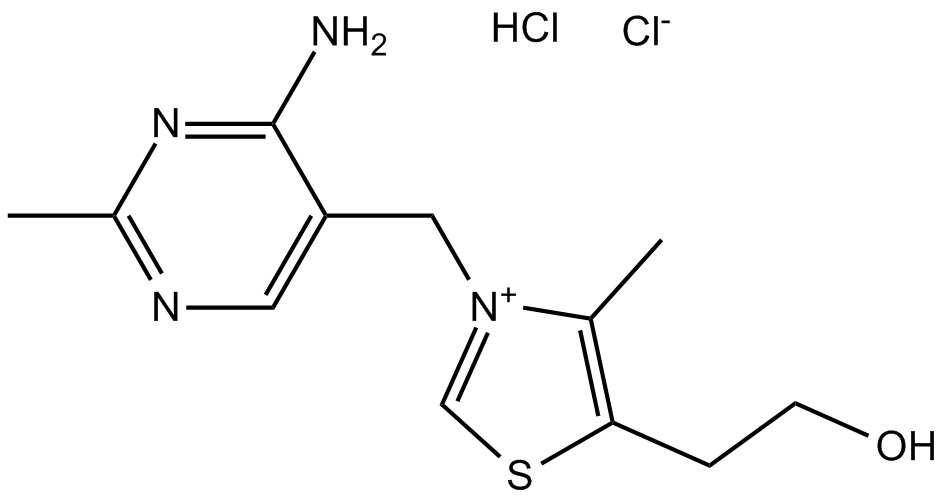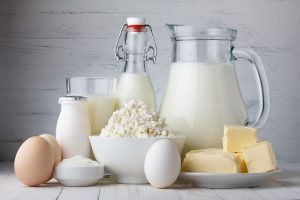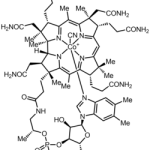What is Thiamine?
Thiamine, also known as thiamin or vitamin B₁. Vitamin B1 is found in many foods including yeast, cereal grains, beans, nuts, and meat. It is often used in combination with other B vitamins, and found in many vitamin B complex products. Vitamin B complexes generally include vitamin B1 (thiamine), vitamin B2 (riboflavin), vitamin B3 (niacin/niacinamide), vitamin B5 (pantothenic acid), vitamin B6 (pyridoxine), vitamin B12 (cyanocobalamin), and folic acid.
Thiamine formula:C12H17N4OS+
Thiamine molecular weight: 265.35 g mol−1
Chemical structure: 
Another name for thiamine: Vitamin B1
Thiamine solubility: Sparingly soluble in water, freely soluble in boiling water, slightly soluble in alcohol and in methanol.
Natural sources of thiamine
Natural Food sources of thiamine include beef, liver, dried milk, nuts, oats, oranges, pork, eggs, seeds, legumes, peas and yeast.
What does thiamine do?
Thiamine, also known as vitamin B-1, is one of the B vitamins. Thiamine is a water-soluble vitamin, meaning it washes out of your body in urine, and isn’t stored in fat cells like some other vitamins. Thiamine can help your body convert carbohydrates to energy; and Thiamine can help your stomach digest foods; Thiamine can also help regulate the flow of electrolytes in and out of the cells of your nerves and muscles.
Reference: https://www.livestrong.com/article/488736-what-does-thiamine-do-for-the-body/
Vitamin B1 thiamine deficiency
Vitamin B1, which is also referred to as thiamine, is a coenzyme used by the body to metabolize food for energy and to maintain proper heart and nerve function. Thiamine is used to digest and extract energy from the foods you eat by turning nutrients into useable energy in the form of “ATP”.
A thiamine deficiency can cause weakness, chronic fatigue, heart complications, psychosis, and nerve damage.
Reference: https://draxe.com/thiamine-deficiency/
How Vitamin B1 thiamine works in your body
Maintains health of mucous membranes
Keeps normal workings of nervous system, heart, and muscles
Helps treat herpes zoster and beriberi
Supports normal growth and development
Restores deficiencies caused by alcoholism, cirrhosis, overactive thyroid, infection, breastfeeding, absorption diseases, pregnancy, prolonged diarrhea, and burns
Reduction of depression, fatigue, and motion sickness
Potential improvement in appetite and mental alertness
What is Vitamin B1 Thiamine Mononitrate?
We are a experienced supplier of vitamin B1 (Thiamine mononitrate) – which helps fight against various health problems, including heart damage. Vitamin B1 is one of the eight water-soluble B vitamins. Vitamin B1 (Thiamine mononitrate), which a vitamin found in food and used as a dietary supplement. As a supplement, it is used to treat and prevent thiamine deficiency and disorders that result from it, including beriberi, Korsakoff’s syndrome, and Korsakoff’s psychosis. Other uses include maple syrup urine disease and Leigh’s disease. It is taken by mouth or by injection. It is also widely used in feed industry as a supplement.
CAS NO.: 532-43-4
MOLECULAR FORMULA: C12H17N5O4S
MOLECULAR WEIGHT: 327.36
Thiamine Mononitrate Properties
Appearance: White or almost white crystals or crystalline powder
Melting point: 198℃
Solubility: Little soluble in water. Slightly soluble in alcohol and chloroform.
Vitamin B1 Thiamine mononitrate Function and benefits
Thiamine mononitrate can benefit following people:
Alcohol or other substance abusers by accelerating metabolism
Those with poor nutritional dietary intake
Age greater than 55 years old
Women who are breastfeeding or pregnant
Recent surgery patients
Those with liver disease, overactive thyroid, or prolonged diarrhea
Coenzyme function:
Thiamine is phosphorylated to phosphate in the cells, as a coenzyme participating in the Oxidative Decarboxylation of ketone acid and the transketolase of pentose phosphate pathway.
Other functions:
Especially useful for keeping the normal function of nerve, muscle and for the myocardium. Also maintain normal appetite, gastrointestinal peristalsis and the secretion of digestive juice.
Some illnesses may be caused by the lack of B1, like beriberi, edema, neurities, neuralgia, dyspepsia, anorexia, slow growth etc.
Difference between Thiamine mononitrate and Thiamine hydrochloride
Thiamine mononitrate and thiamine hydrochloride are two forms of Vitamin B1 manufactured by adding different groups to thiamine. They have different molar weight, physical and chemical properties depending on their chemical structures. The main difference between thiamine mononitrate and thiamine hydrochloride is that thiamine mononitrate is non-hygroscopic whereas thiamine hydrochloride is hygroscopic.
Vitamin B1 Thiamine Mononitrate
Thiamine mononitrate is a synthetic stable nitrate salt form of vitamin B1.Thiamine mononitrate is a synthetic stable nitrate salt form of vitamin B1. Thiamine mononitrate is also known as vitamin B1 nitrate and has the molecular formula C12H17N5O4S. The molar weight is 327.36 g/mol.
Thiamine mononitrate can be manufactured from thiamine hydrochloride. It is produced by removing chloride ion and mixing with nitric acid. Then, a nitrate ion combines with the thiamine molecule. Thiamine mononitrate is more stable than Thiamine hydrochloride.
Thiamine mononitrate can be used in multivitamin formulations and as a food and feed additive.
Chemical structure: 
Vitamin B1 Thiamine Hydrochloride
Thiamine hydrochloride is another form of Vitamin B1 which has the chemical formula HC12H17ON4SCl2. The molar weight is about 337.263 g/mol.
Thiamine hydrochloride is the hydrochloride form of thiamine. It is a salt composed of a cation and an anion. Anion is the chloride ion. This compound is available as crystals and has a slight odor. It is soluble in water and forms a clear colorless aqueous solution. It can be used in multivitamin formulations and as a food and feed additive.
Chemical structure: 
Vitamin B1 Thiamine Mononitrate Use
Is Vitamin B1 Thiamine mononitrate vegan?
Thiamine mononitrate is used as an additive to in foods such as enriched wheat or white flour. It is considered vegan as thiamine is naturally occurring in foods as a vitamin and mixed with nitric acid to become an additive.
What is Vitamin B1 Thiamine mononitrate used for?
It used to fortify foods as a supplement in food and feed. Two of the synthetic forms are known as thiamine mononitrate and thiamine hydrochloride.
Thiamine recommended daily intake
Men: 1.2 mg
Women: 1.1 mg
Pregnancy: 1.4 mg
Lactation: 1.5 mg
Vitamin B1 Thiamine mononitrate use in food
Thiamine mononitrate is a water-soluble vitamin that is naturally found in grains, yeast, and animal organ meat. It can be used in food as a vitamin B1 source supplement.
Vitamin B1 Thiamine mononitrate use in feed
Thiamine mononitrate plays a key role in helping your dog metabolize energy.
Vitamin B1 Thiamine Mononitrate Side effects
Is Thiamine mononitrate good for you?
As a safe food and feed additive, thiamine mononitrate is generally recognized as a safe Vitamin and good for people and poultry, but there maybe some side effects:
- blue colored lips;
- chest pain, feeling short of breath;
- black, bloody, or tarry stools; or
- coughing up blood or vomit that looks like coffee grounds.
Vitamin B1 Thiamine Mononitrate Market
Thiamine mononitrate manufacturers and price
The world’s major manufacturers and suppliers of vitamin B1 (Thiamine mononitrate and Thiamine hydrochloride) include Tianxin, Huazhong, Brother and DSM, which account for 97% of globalvitamin B1 production capacity. In 2016, the global output of vitamin B1 (Thiamine mononitrate and Thiamine hydrochloride) was about 7,530 tons, and the production of China was 6,530 tons, which occupies an absolutely dominant position.
Among these manufacturers, the production capacity of the Brother was 3,200 tons, and the output is about 1400 tons, which accounts for 21% of the total China production. In 2016, the export volume of China’s vitamin B1 was about 5510 tons, and its export share had not changed much over the years. The main players in China are Tianxin, Huazhong and Brother.
In 2007, there were around 10 manufacturers of vitamin B1 (Thiamine mononitrate and Thiamine hydrochloride) in China. In the past five years, the market was stable. The only three major manufacturers in China market, Tianxin, Huazhong and Brother, accounted for 87% of the global market share.
Vitamin B1 is widely used as feed additives (37%), cosmetics (51%) and food (12%). Vitamin B1 is necessary feed, food, and pharmaceutical health products. However, it accounts for a very low proportion of production costs. Because of the increase in raw material prices, downstream manufacturers also pass through the price increase to the cost, so the downstream can tolerate its continuous price increase.
Vitamin B1 wastewater contains many thiamine compounds. Because of its high nitrogen content, it has the characteristics of high organic concentration, deep color, high turbidity, poor biodegradability, large fluctuations in water quantity and water quality, so it is a kind of industrial wastewater that is difficult to biodegrade. If a large number of discharges are not treated, it is easy to make the water black, change the odor, and there are phenomena such as water and vivid plant malformation and mutagenesis.
Environmental inspectors have pushed up environmental protection equipment and maintenance costs. As the government conducts regular inspections throughout the country, major production companies are facing the pressure of long-term sewage discharge. The three oligarchic companies generally adopt measures to limit production and reduce emissions, and prices have increased in 2017. At the end of July 2017, the price rose from 380 yuan/kg to 595 yuan/kg in recent days. The average international export price increased from 20.01 USD/kg to 26.59 USD/kg, and the export volume and export value of China manufacturers and suppliers also increased steadily.
China is the big Thiamine mononitrate manufacturers and export country in the world.
There are several Thiamine mononitrate manufacturers in China and abroad, as you know, the price of China suppliers can be better than abroad manufacturers. We have worked with China top manufacturer for years, we would like to recommend our selected Thiamine mononitrate manufacturers to you if you would like to save your purchasing cost with the same quality compared with abroad manufacturers. Thiamine mononitrate Samples are available if you need it for further test.
Today’s Thiamine mononitrate price
Updated on 2018/05/26: Now the price is around RMB280/kg, the price in January was around RMB510/kg, it decreased around 45%.
Where to buy Thiamine mononitrate?
You can buy Thiamine mononitrate from us. We’re committed to the quality and safety of our ingredients. We know that our customers expect us to use only the highest quality food additives & ingredients with better price, and we do everything we can to satisfy those expectations.
Usage: Used for feed additive, food additive and pharmaceutical material.
Quality Standards: Complies with USP/BP/EP/CP
STORAGE: Stored in tight, light-resistant containers. The shelf life is 36 months with the primary package.
PACKAGE: 25KG/carton or drum
If you have any other questions, please email us through: info@foodsweeteners.com




